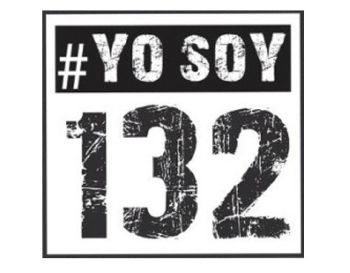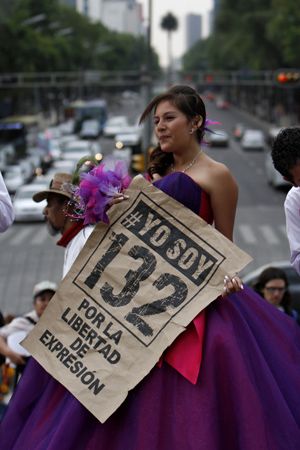
Publisher:
Bonnie King
CONTACT:
Newsroom@Salem-news.com
Advertising:
Adsales@Salem-news.com

~Truth~
~Justice~
~Peace~
TJP
Jun-28-2012 04:01

 TweetFollow @OregonNews
TweetFollow @OregonNews
Mexico's Youth Movement Forges Ahead
Kent Patterson for Salem-News.com132 Movement forges ahead and can even claim credit for unprecedented developments in political messaging delivered this election year.
 Courtesy: Global Post |
(LAS CRUCES, NM) - The impact of a social movement can often be gauged not only by the societal reception it gets, but also by the reaction it engenders. And Mexico’s “ I am 132 Movement” is no exception.
Born only several weeks ago as a Mexico City protest of private university students against the media imposition of presidential candidate Enrique Pena Nieto of the Institutional Revolutionary Party (PRI) and Green Party (PVEM) electoral alliance, the movement has since spread to large cities and small towns across the country. In the Pacific coast tourist town of Zihuatanejo, Guerrero, an estimated 250 young people and their supporters took to the streets earlier this month to demonstrate against Pena Nieto and to call for the democratization of an electronic media dominated by two networks, Televisa and TV Azteça.
“This was the first march that was done by young people in the history of the municipality,” Alondra Garcia, 132 organizer, told Frontera NorteSur. Acknowledging that members of anti-Pena political parties participated in the action, Garcia nonetheless rejected charges by Pena’s PRI party that the 132 Movement is a front for rival candidates, especially the Progressive Movement’s Andres Lopez Obrador.
“We are non-partisan and receive all who come,” Garcia said, adding that even dissatisfied members of the PRI have expressed support for the 132 effort. “Everyone is welcome,” she said, “and everyone from kids to older people has come out.”
Yet less than a week before the July 1 elections, the heat is being turned up in subtle and not-so-subtle ways on the 312 Movement. Media accounts report aggressions and/or cases of alleged police harassment against 132ers in the states of Chihuahua, Guanajuato, Morelos, Michoacan, and Guerrero. According to Garcia and fellow activist Victor Ruiz, a group of 40 or so young PRI members in Zihuatanejo recently held their own demonstration claiming to be 132ers that supported Pena Nieto. In the central city of Aguascalientes and other places, counter-132 groups sponsored by the PRI have similarly sprung up in the days leading up to the elections. A video of a former 132 member spilling the beans on the Lopez Obrador camp’s supposed hidden hand behind the movement recently received prominent play on the same television channels that are the targets of Mexico’s newest social movement.
Despite the opposition, the 132 Movement forges ahead and can even claim credit for unprecedented developments in the way political messaging has been delivered this election year. Perhaps the movement’s greatest single success so far has been the Internet transmission of a third, previously unscheduled presidential debate on June 19.
Inspired and organized by the 132 Movement, the event was a flowing interaction between three of the four presidential contenders and young questioners who pressed the candidates on issues that have gotten short-shrift in the campaign such as the future of Mexico’s indigenous peoples and their languages.
 'Yo Soy'... 'I am' 132: dreamantilles.blogspot.com |
Candidate Josefina Vazquez Mota of the The National Action Party (PAN) used the occasion to announce her choices for a possible presidential cabinet, revealing the names to the Internet audience even before telling the nominees themselves. A striking visual aspect of the production set was the empty chair reserved for Pena Nieto, who declined an invitation to attend on the grounds that the sponsors were not impartial.
Technical glitches interrupted the first minutes of the debate, reportedly because of an over-saturation of the website, but the event went forward both in cyberspace and in public plazas where 132ers set up large screens for passerby to view.
Flanking a screen in downtown Aguascalientes, a large information booth was visited by steady groups of residents who looked over photos of government atrocities like the 1995 Aguas Blancas massacre and read critical quotes about Pena Nieto from posters of intellectuals and journalists including the late Carlos Fuentes, Enrique Krauze, Lydia Cacho, and Denise Dresser. Declining to give their names, an older man and a younger couple said the pictures accurately reflected the national reality.
In a comparitive display, a map depicting areas governed by PRI local and state administrations was placed next to one of territories under control of drug traffickers along with the question: “Do you see a difference?”
Alejandro Hernandez, a small businessman, said the idea of transmitting an important political event in the street was a “beautiful idea,” as well as an example of modern technological innovation. But disagreeing with the 132ers’ stance on Pena Nieto, the young man said he understood why the candidate did not participate in the debate. Concerned about tax policy and burdensome paperwork, Hernandez said he planned to vote for the PRI’s man.
Aguascalientes activists quickly moved from publicly transmitting the presidential debate to holding forums featuring local candidates for the federal Congress. An invitation to the PRI to present its candidates on June 20 was ignored, but the PAN turned out for a forum at a downtown restaurant the next day.
PAN candidates including former Aguascalientes Mayor Martin Orozco promoted free market and right-to-work reforms, urged continued action against organized crime, called for the eradication of poverty and upheld pro-life principles. Luis Manuel Medina, candidate for the lower house of the Mexican Congress, addressed the critical issue of wáter use and conservation. According to Medina, agricultural producers near the town of Calvillo, Aguascalientes, were now pumping groundwater from below 1,500 of the surface. “We can’t be overexploiting water, because it will come to an end,” he warned.
Tere Jimenez, a 28-year-old running for another local seat in the Congress’ lower house, praised the new youth activism. In her presentation, Jimenez outlined how she would deal with poverty and drug addiction. “I want to transform Mexico into a place where differences in ideas are part of a different Mexico,” Jimenez added. . “Mexico has to change, and we can’t return to a corrupt past in which it is like being in prison.”
Like the June 19 Internet debate, the Aguascalientes forum was a ground-breaking one in that it went beyond the typical unidirectional political messages delivered to a passive public and instead involved an interactive exchange with an aware citzenry assembled outside the structures of the political party system. Following the candidate’s prepared presentations, youthful members of the audience of several dozen people challenged the PAN on matters including the high tuition rates at the local university, prison and judicial reform, gender equality, same-sex marriage, and gay adoption.
Forum co-organizer David Juarez detected lines of division between the PAN and and followers of his movement, but gave the conservative party credit for making their program public and answering questions. “The party platform was presented, but it was contrary to principles of equality and sustainability,” Juarez said. “They back a minimal state, and a state that practically does not intervene while leaving everything up to the private sector.”
In an incredibly short period of time, the 132 Movement has carved out a significant position in national political life by directly confronting a formerly, semi-taboo issue: who controls the flow of information, and to what ends.
The movement’s contention that powerful political figures, the state and private media interests are virtually interlocked is supported by a recent study conducted by the Citizen Committee for Electoral Observation. According to a story about the group’s findings by the Proceso news service, 18 Congressional candidates have professional or family ties to Televisa, TV Azteca, the National Chamber of the Telecommunications Cable Industry and other media interests. The candidates studied included members of the PRI, PVEM (Green) and Citizen Movement parties.
In contemporary Mexico, the power of the boob tube cannot be underestimated. Based on the citizens’ committee survey, Mexican academic and political analyst Lorenzo Meyer noted in a recent column that 80 percent of 3,480 respondents told interviewers that they got their news from television, while only 7 percent relied on radio and even less, 6 percent, on print media.
 |
For 132 activists Alondra Garcia and Victor Ruiz, issues of media access, official manipulation and freedom of expression are both deeply political and personal questions. As young journalists in a conflictive part of Mexico, Garcia and Ruiz both said there were many stories they cannot touch without facing extremely grave consequences.
Last year, Garcia recalled going to the state capital of Chilpancingo to cover the formation of a state truth commission dedicated to clarifying the fates of more than 600 people who were forcibly disappeared by government security forces in Guerrero during the Dirty War of the 1970s. Shortly afterward, Garcia’s supervisor received an anonymous message warning the publication to back off from the story.
The students and young professionals making up the 132 Movement encounter other frustrations, Ruiz added. “We pay for years of college, leave and then there is no work,” Ruiz said. The journalism school graduate identified the spirit and goals of his movement with the long struggle of the Chilean students for affordable education, Occupy Wall Street and other manifestations of the new global youth rebellion.
"(132) been called the Mexican spring,” Ruiz said. “It was late in arriving, but it came and it will be hard to get rid of.”
132 Movement activists plan to keep demanding government transparency, clean elections and media democracy after the July 1 elections. In the few days prior to the voting, they are expected to be in the streets in Mexico City and elsewhere protesting against Televisa, the Federal Electoral Institute and political manipulation and corruption in general.
Meanwhile, new messages that may or may not be the work of people influenced by the 132 Movement have begun appearing in downtown Zihuatanejo. Signed by “Street Tweet,” the short but poignant messages are hand-written on large sheets of brown paper and posted in visible public spots. Positioned across from a new bar that blasts songs speaking of gunslingers and grenade launchers and just down the street from the naval base where masked marines leave on patrol, one of the messages reads: “If there were more guitars than arms, there would be more musicians than soldiers.”
Another street tweet reads: “Never doubt that a small group of committed and thinking citizens can change the world. In fact, they are the only ones who have ever done it.”
-Kent Paterson
Frontera NorteSur: on-line, U.S.-Mexico border news
Center for Latin American and Border Studies
New Mexico State University
Las Cruces, New Mexico
-------------------------------
Tweet
Follow @OregonNews
 |
 |
 |
 |
 |
 |
 |
Articles for June 27, 2012 | Articles for June 28, 2012 | Articles for June 29, 2012

Quick Links
DINING
Willamette UniversityGoudy Commons Cafe
Dine on the Queen
Willamette Queen Sternwheeler
MUST SEE SALEM
Oregon Capitol ToursCapitol History Gateway
Willamette River Ride
Willamette Queen Sternwheeler
Historic Home Tours:
Deepwood Museum
The Bush House
Gaiety Hollow Garden
AUCTIONS - APPRAISALS
Auction Masters & AppraisalsCONSTRUCTION SERVICES
Roofing and ContractingSheridan, Ore.
ONLINE SHOPPING
Special Occasion DressesAdvertise with Salem-News
Contact:AdSales@Salem-News.com


Salem-News.com:
Terms of Service | Privacy Policy
All comments and messages are approved by people and self promotional links or unacceptable comments are denied.
[Return to Top]
©2026 Salem-News.com. All opinions expressed in this article are those of the author and do not necessarily reflect those of Salem-News.com.